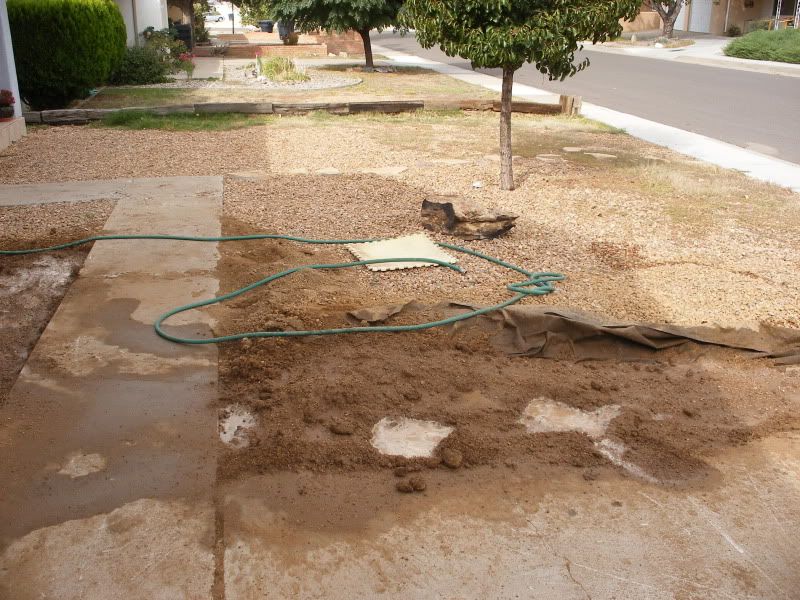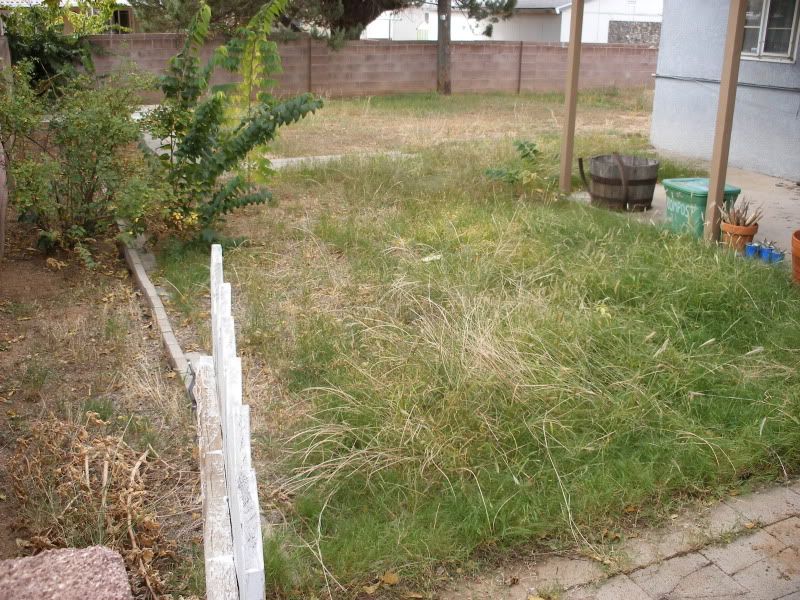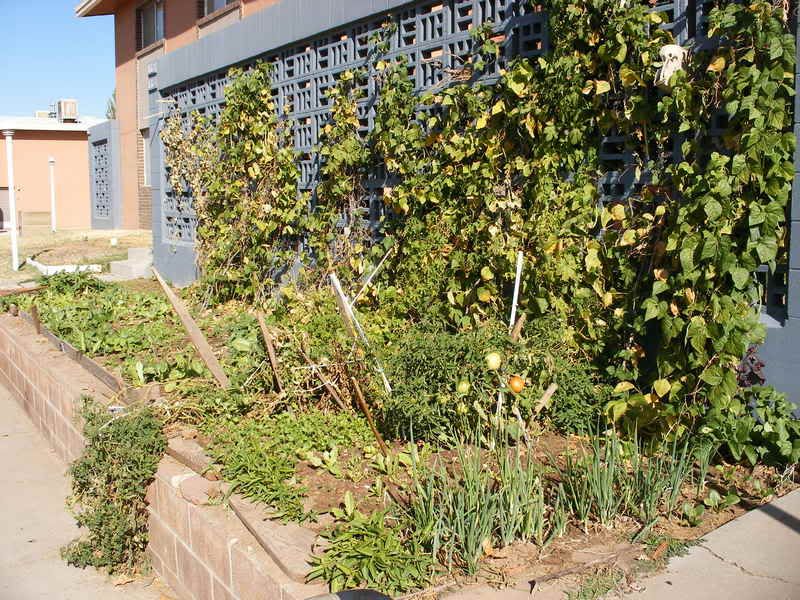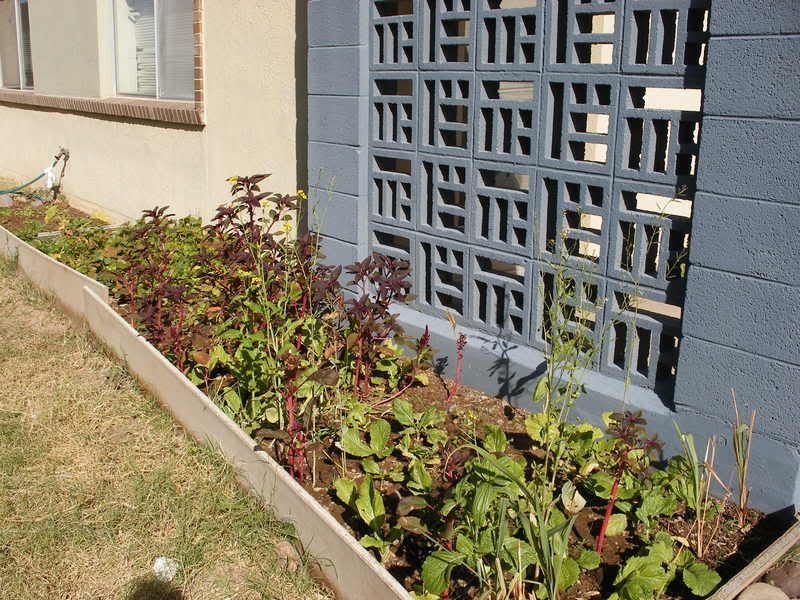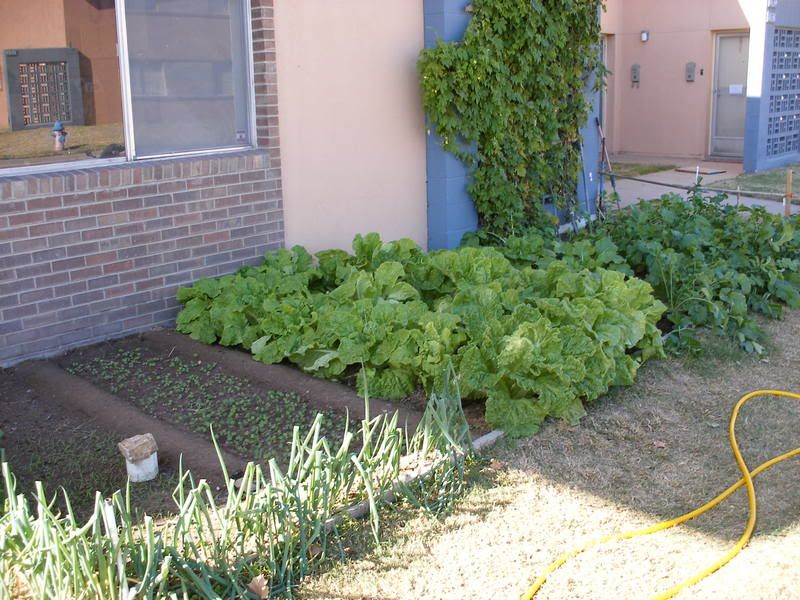Gardens are great at many things, not the least of which is tethering us to the larger cycles of nature. Most of civilization's advancements revolve around protecting us from those cycles. Roofs, walls, furnaces, air conditioners, global agriculture and shipping all shield us and make us ignorant of the seasons, the closed loops of growth, death, and rebirth that surround us. A garden, on the other hand, involves us in those cycles, allowing us to observe and celebrate their intricacies.
Today I want to introduce you to an exciting new cycle in my life. My wife and I have just brought our first house. With it comes a yard which doesn't look like much now but offers a lifetime of gardening to me. Finally I can set to work building those cycles up around me. I can care for the soil and know that I will be around to reap the benefits. More, I can plant and know that I will be around to harvest!
The front yard is pretty generic for our area. It reflects this houses history as a rental property with low maintenance but bland landscaping. It's covered in red rock with one fruitless pear rising out of the very centre. ion the photo you can see that we are battling a host of weeds that spring up between the rocks as well as the muddy dirt where I've replaced the house's water line. I'm not exactly sure what I want it to look like but I have some ideas. I would like to plant it with water-wise but useful plants. Pinyon Pine and prickeless Prickly Pear are at the top of my list. I know I want to leave it open enough that it will feel inviting to our neighbours when my wife and I sit on the porch in the evening.
In the backyard I have let my imagination run wild. Now it is empty but for weeds but in my mind it is overflowing with life. I would love to have a small patch of grass for the kids I hope to have, edged with dwarf fruit trees and day lilys. Where there is now a concrete slab, the foundation of an old shed, I would like to erect a chicken coop. By the edge of the covered patio I would love to build an horno. And, of course, I envision many garden beds.
I hope you will join me, reading along as I construct a new garden around my home, a garden as unique as I am and as long living as I wish it to be!
Showing posts with label memories. Show all posts
Showing posts with label memories. Show all posts
Monday, October 3, 2011
Friday, April 22, 2011
Garden as Memorial
My grandfather, who's garden I have written about before, suffered a massive and unexpected heart attack and died recently. I've spent the past two weekends down in the city of the City of the Crosses helping out my grandmother in any way I can. I don't know if this is normal, but for our family that means yard-work.
I helped my father do some heavy pruning on a fig tree that suffered some damage this past winter. I built row covers to keep rabbits out of the vegetable beds. I helped tie back my grandmother's favourite rose to protect it from the 60 mph winds. I did it all because I know it's what my grandfather would have been doing.
Nor was I the only one. When the kids next door heard what had happened, they marched over, solemnly hugged my grandmother, and announced that they would weed her garden for her this summer. It was touching how, after years of playing in the garden, they knew exactly how they could help. They also swept her porch and planted seeds in a vegetable bed.
My grandfather once told me that two things in his life made him more proud than anything else. First, that he had raised four good daughters. Secondly, that he had positively impacted at least one plot of land. He viewed his garden as a form of stewardship to the earth and liked to think that he had made a lasting mark, by improving the soil, in that area.
The garden was once one of his passions, a joyous project. I hope that now it will continue to grow as a living memorial to him. I hope that as my grandmother, myself, the kids, and other continue to tend the garden we will also be tending our memories of him. I hope that neighbours walking past the garden will think of him. I hope the garden continues to grow for a long time.
I helped my father do some heavy pruning on a fig tree that suffered some damage this past winter. I built row covers to keep rabbits out of the vegetable beds. I helped tie back my grandmother's favourite rose to protect it from the 60 mph winds. I did it all because I know it's what my grandfather would have been doing.
Nor was I the only one. When the kids next door heard what had happened, they marched over, solemnly hugged my grandmother, and announced that they would weed her garden for her this summer. It was touching how, after years of playing in the garden, they knew exactly how they could help. They also swept her porch and planted seeds in a vegetable bed.
My grandfather once told me that two things in his life made him more proud than anything else. First, that he had raised four good daughters. Secondly, that he had positively impacted at least one plot of land. He viewed his garden as a form of stewardship to the earth and liked to think that he had made a lasting mark, by improving the soil, in that area.
The garden was once one of his passions, a joyous project. I hope that now it will continue to grow as a living memorial to him. I hope that as my grandmother, myself, the kids, and other continue to tend the garden we will also be tending our memories of him. I hope that neighbours walking past the garden will think of him. I hope the garden continues to grow for a long time.
Monday, April 18, 2011
Gardens I Have Known: Part 4
At my last apartment I had a nice little garden. This garden, I think, epitomises me as gardener right now. It was poorly planned, badly timed, and improperly utilized but still beautiful, ambitious, resourceful, and a heck of a lot of fun.
We moved into the apartment at the very beginning of July. This is not, of course, the right time to start a garden. Still, I started working on it, claiming that I was just going to start preparing the soil. I would weed it, turn it over, and maybe have it ready for some fall crops. That is not what ended up happening.
About the same time I finished pulling out the mess of dead wildflowers, left by the previous tenant, some tomatoes, ready for transplant, appeared on the break room table at work. Of course, I couldn't turn them down so I carried home one "Cuor Di Bue" and planted it. But one tomato looked lonely so I searched for other plants to add in.
I acquired mint, thyme, oregano, garlic, and chives from my mother's garden. Free first, cheap second, as the saying goes. I swung by Lowe's for some soaker hose and just had to pick up some other plants while I was there. I got two more tomatoes (Mr. Stripey and Patio), two chili peppers (NM Big Jim and Garden Salsa), Thai Basil, and Flat-leafed Parsley, and a Cucumber for a big pot. That Saturday I could help adding a Fennel and a Rosemary from the farmers market. In September I dug up another patch and planted Daylilies that I helped my mother divide out of her yard along with Cauliflower, Radishes, and as mix of Lettuce.
I laid down soaker hose and mulched it well with free grass clipping. Tending this little garden was my favourite escape. My neighbours all praised it and thought about digging up the lawn in front of their apartments too, though no one actually got around to it.
Ultimately, some of the plants did well and some did not. The cucumber was productive. The chili plants gave us more chili than I could really use. I got a huge bowl of radishes that I offered to the neighbours. The rosemary, on the other hand, dried up. The parsley shrivelled up. The cauliflower was devoured by caterpillars and the lettuce never did much of anything. Worst of all, the tomatoes never ripened. I picked a huge bowl of green tomato-marbles before frost to no avail.
Then, in January, we moved out. What would have happened this year if it were still my garden and I could start on time? Would the daylilies have established themselves? Would the garlic have come up? Could I have gotten tomatoes this year?
I gained alot in that garden. I started a worm bin that will enrich my future gardens. I began to learn how to make due with what I have available, both physically and time-wise. I think in that garden I actually became a gardener.
So, where do I go from here? Surely this isn't going to be the high point of my gardening experience. I should just be the beginning. The metaphorical plant have finally established themselves in the garden of my mind and now I should look forward to a long summer of lush growth. That's what this blog is for, tracking the physical blooms of my mind-garden. I can't wait till my mind sets fruit.
We moved into the apartment at the very beginning of July. This is not, of course, the right time to start a garden. Still, I started working on it, claiming that I was just going to start preparing the soil. I would weed it, turn it over, and maybe have it ready for some fall crops. That is not what ended up happening.
About the same time I finished pulling out the mess of dead wildflowers, left by the previous tenant, some tomatoes, ready for transplant, appeared on the break room table at work. Of course, I couldn't turn them down so I carried home one "Cuor Di Bue" and planted it. But one tomato looked lonely so I searched for other plants to add in.
I acquired mint, thyme, oregano, garlic, and chives from my mother's garden. Free first, cheap second, as the saying goes. I swung by Lowe's for some soaker hose and just had to pick up some other plants while I was there. I got two more tomatoes (Mr. Stripey and Patio), two chili peppers (NM Big Jim and Garden Salsa), Thai Basil, and Flat-leafed Parsley, and a Cucumber for a big pot. That Saturday I could help adding a Fennel and a Rosemary from the farmers market. In September I dug up another patch and planted Daylilies that I helped my mother divide out of her yard along with Cauliflower, Radishes, and as mix of Lettuce.
I laid down soaker hose and mulched it well with free grass clipping. Tending this little garden was my favourite escape. My neighbours all praised it and thought about digging up the lawn in front of their apartments too, though no one actually got around to it.
Ultimately, some of the plants did well and some did not. The cucumber was productive. The chili plants gave us more chili than I could really use. I got a huge bowl of radishes that I offered to the neighbours. The rosemary, on the other hand, dried up. The parsley shrivelled up. The cauliflower was devoured by caterpillars and the lettuce never did much of anything. Worst of all, the tomatoes never ripened. I picked a huge bowl of green tomato-marbles before frost to no avail.
Then, in January, we moved out. What would have happened this year if it were still my garden and I could start on time? Would the daylilies have established themselves? Would the garlic have come up? Could I have gotten tomatoes this year?
I gained alot in that garden. I started a worm bin that will enrich my future gardens. I began to learn how to make due with what I have available, both physically and time-wise. I think in that garden I actually became a gardener.
So, where do I go from here? Surely this isn't going to be the high point of my gardening experience. I should just be the beginning. The metaphorical plant have finally established themselves in the garden of my mind and now I should look forward to a long summer of lush growth. That's what this blog is for, tracking the physical blooms of my mind-garden. I can't wait till my mind sets fruit.
Monday, April 4, 2011
Gardens I Have Known: Part 3
This covers not a single garden but a whole gardening community. It is also about the first garden that was actually mine. There are small plants, big ideas, and casual acts of sedition.
While attending the state university in the City of the Crosses I lived in the student family housing. This was unusual because I was not married and did not have children but the university allowed it because they had more housing than families. This worked well for me because I enjoyed having my own room, a neighbourhood full of families and children, and the quieter living that can't take place in the dorms.
Many of the other occupants of the student family housing were, for whatever reason, Asian families much larger than the standard American nuclear family. And most of these families, independently and without any organizing force, maintained gardens tended by the older members of the family. I believe that these gardens (I counted more than thirty of them at one point) had a profound effect on the feel of the neighbourhood. What could have been little more than a complex of units, storing students when they weren't in class, was turned into a pleasant place where people and plants both grew to be useful.
Almost all of these gardens overgrew the small walled-in yards attached to each housing unit, spilling over into the more communal grassy areas near the sidewalks. Year round there were both common and exotic greens, peppers, and other vegetables growing and being harvested all around the neighbourhood. Tomatoes and peppers were always drying in the sun atop mailboxes and green utility boxes. Where the University had intended bermuda and crab grass to grow I got to see Bok Choy and Bitter Melons being cultivated.
You may have noticed the conflict in that last sentence. There was a difference between the University's intention and what was being done with the land. I don't believe that the gardeners saw it as an act of rebellion (There was land that wasn't really being used, so they put it to good use) but they went against the University with every seed they planted. They were, unwittingly, an army of guerilla gardeners. Frequently there were notices posted on every door in the neighbourhood stating that gardens were not allowed outside of the yards provided. As near as I could tell, though, this never stopped anyone.
In the midst of all this excitement and inspiration I decided to plant my first garden. With tools borrowed from my grandparents I painstakingly pulled up all the weeds and grass rooted in my little yard. I turned as much manure and garden soil as I could buy into the sandy soil. I laid down pathways and boarders built from rocks and bricks that I scrounged from around the neighbourhood. I planted radishes, carrots, beets, lettuce, spinach, peas, swiss chard, and anything else I though would be ready to harvest before the end of the semester.
Very little actually grew in my garden. Perhaps there was just never enough organic matter in the soil. Maybe I didn't water it well enough. It could be that I just planted everything at the wrong times. Whatever the reason, in the four years I worked on that garden I think I probably harvested no more than 6 woody carrots, one swiss chard plant, three pounds of snap peas, and a few leaves of parsley. It was never exactly the urban farm I had hoped for after seeing what my neighbours grew.
Still, I think fondly of those gardens. I admire the ingenuity and perseverance of those gardeners. Someday I hope to tend a garden that is a riot of produce like theirs. Even though I have never tasted one, that garden will probably include Bitter Melons, my personal symbol of true guerilla gardening.
While attending the state university in the City of the Crosses I lived in the student family housing. This was unusual because I was not married and did not have children but the university allowed it because they had more housing than families. This worked well for me because I enjoyed having my own room, a neighbourhood full of families and children, and the quieter living that can't take place in the dorms.
Many of the other occupants of the student family housing were, for whatever reason, Asian families much larger than the standard American nuclear family. And most of these families, independently and without any organizing force, maintained gardens tended by the older members of the family. I believe that these gardens (I counted more than thirty of them at one point) had a profound effect on the feel of the neighbourhood. What could have been little more than a complex of units, storing students when they weren't in class, was turned into a pleasant place where people and plants both grew to be useful.
Almost all of these gardens overgrew the small walled-in yards attached to each housing unit, spilling over into the more communal grassy areas near the sidewalks. Year round there were both common and exotic greens, peppers, and other vegetables growing and being harvested all around the neighbourhood. Tomatoes and peppers were always drying in the sun atop mailboxes and green utility boxes. Where the University had intended bermuda and crab grass to grow I got to see Bok Choy and Bitter Melons being cultivated.
You may have noticed the conflict in that last sentence. There was a difference between the University's intention and what was being done with the land. I don't believe that the gardeners saw it as an act of rebellion (There was land that wasn't really being used, so they put it to good use) but they went against the University with every seed they planted. They were, unwittingly, an army of guerilla gardeners. Frequently there were notices posted on every door in the neighbourhood stating that gardens were not allowed outside of the yards provided. As near as I could tell, though, this never stopped anyone.
In the midst of all this excitement and inspiration I decided to plant my first garden. With tools borrowed from my grandparents I painstakingly pulled up all the weeds and grass rooted in my little yard. I turned as much manure and garden soil as I could buy into the sandy soil. I laid down pathways and boarders built from rocks and bricks that I scrounged from around the neighbourhood. I planted radishes, carrots, beets, lettuce, spinach, peas, swiss chard, and anything else I though would be ready to harvest before the end of the semester.
Very little actually grew in my garden. Perhaps there was just never enough organic matter in the soil. Maybe I didn't water it well enough. It could be that I just planted everything at the wrong times. Whatever the reason, in the four years I worked on that garden I think I probably harvested no more than 6 woody carrots, one swiss chard plant, three pounds of snap peas, and a few leaves of parsley. It was never exactly the urban farm I had hoped for after seeing what my neighbours grew.
Still, I think fondly of those gardens. I admire the ingenuity and perseverance of those gardeners. Someday I hope to tend a garden that is a riot of produce like theirs. Even though I have never tasted one, that garden will probably include Bitter Melons, my personal symbol of true guerilla gardening.
Monday, March 21, 2011
Gardens I Have Known: Part 2
After a year in the Frozen North, I transferred to the state university down south in the City of the Crosses. My grandparents live there and maintain a large garden that occupies the lot next to their home. I learned a great deal in that garden, while taking weekend breaks from my studies.
The section nearest the road is occupied by a rock garden. A few pine trees form a permeable barrier between the garden and the rest of the world. Behind this is a small lawn, surrounded by flowers, where my grandparents hosted picnics and barbecues. Lastly, at the back of the lot, are raised vegetable beds, fruit trees, and a compost pile.
I got my first taste of vertical gardening from the wall that frequently has small melons and pumpkins growing up it. I also got my first look at the ingenuity of the gardener from the row covers and rabbit guards my grandpa devised to keep the brutal heat and rabbits away from his vegetable beds. I gained an appreciation for mixed wildflowers from the sandy bed they let reseed itself.
More importantly, I began to learn the art of pruning (as opposed the simple necessity of pruning instilled in me by my parents) from helping my aunt tame the roses and fruit trees every spring. I got a feel for drip irrigation from helping my grandpa repair his. I began to think about the placement of gardens here, how it affects the garden, the gardener, and the community, as my grandparents garden was neither fenced off nor concealed behind a house.
If my parents' garden planted the seed of gardening in me, it didn't really germinate till I spent time in my grandparents' garden. Here, my ideas of gardening morphed beyond simply mixing soil, water, and seed. If I enjoy pruning a rosebush or planning out gardens in my notebook, it can be traced back to my grandparent's garden.
The section nearest the road is occupied by a rock garden. A few pine trees form a permeable barrier between the garden and the rest of the world. Behind this is a small lawn, surrounded by flowers, where my grandparents hosted picnics and barbecues. Lastly, at the back of the lot, are raised vegetable beds, fruit trees, and a compost pile.
I got my first taste of vertical gardening from the wall that frequently has small melons and pumpkins growing up it. I also got my first look at the ingenuity of the gardener from the row covers and rabbit guards my grandpa devised to keep the brutal heat and rabbits away from his vegetable beds. I gained an appreciation for mixed wildflowers from the sandy bed they let reseed itself.
More importantly, I began to learn the art of pruning (as opposed the simple necessity of pruning instilled in me by my parents) from helping my aunt tame the roses and fruit trees every spring. I got a feel for drip irrigation from helping my grandpa repair his. I began to think about the placement of gardens here, how it affects the garden, the gardener, and the community, as my grandparents garden was neither fenced off nor concealed behind a house.
If my parents' garden planted the seed of gardening in me, it didn't really germinate till I spent time in my grandparents' garden. Here, my ideas of gardening morphed beyond simply mixing soil, water, and seed. If I enjoy pruning a rosebush or planning out gardens in my notebook, it can be traced back to my grandparent's garden.
Tuesday, March 8, 2011
Gardens I Have Known: Part 1
My first garden was, and this may be typical of many gardeners, my parents' garden. There were four large raised beds that were filled with vegetables during the warm months, a bed dedicated to herbs nearby, a decent bit of lawn with a good hill for rolling down, several fruit trees which occasionally produced, and some rather over grown flower beds. It will probably always be, in my mind, a significant part of the way gardens are supposed to be.
Shortly after my family moved into a new house with a large backyard that I became involved in our yard. You see, other than the lawn, there was no yard when we moved in. Immediately my father began sculpting the weeds and dirt into the picturesque space it is now and from the start I worked along side him. I learned about laying sod, breaking concrete, mowing and pruning from my father.
A few years later my mother allowed me to have one of the vegetable beds, provided I weeded and watered it. Every year the idea that I could plant whatever I wanted excited me for a couple of weeks until the heat of the summer curbed my enthusiasm. Usually a pumpkin vine would survive my neglect and produce a few puny squash to sit on our stoop during the autumn months. While I may not have learned diligence or, really, many horticultural skills from those summer crops, I did develop a need to plant things, a positive addiction to getting my hands dirty each spring.
In this garden I butchered and killed a couple of rosemary plants as I tried to make "bonsai". This garden provided countless beetles, lizards, and tomato worms that I tried to keep as pets. In this garden I figured out how to crush yucca leaves and strip the fibers to make rope. The trellis, covered in trumpet vine, which I climbed up to hid and think about things was in this garden.
Of course, this garden isn't really in my past. If I am over for dinner during the summer, I still get to sit in the garden and taste it's produce. I acquire mint and oregano from that herb garden, daylilies from one of the flower beds. I have a maple sapling rooted in one of the vegetable beds that, if it survived my absence and the winter, I will dig up and try to train into a bonsai with my brother later this month. And I still get roped into doing some mowing or pruning occasionally.
Shortly after my family moved into a new house with a large backyard that I became involved in our yard. You see, other than the lawn, there was no yard when we moved in. Immediately my father began sculpting the weeds and dirt into the picturesque space it is now and from the start I worked along side him. I learned about laying sod, breaking concrete, mowing and pruning from my father.
A few years later my mother allowed me to have one of the vegetable beds, provided I weeded and watered it. Every year the idea that I could plant whatever I wanted excited me for a couple of weeks until the heat of the summer curbed my enthusiasm. Usually a pumpkin vine would survive my neglect and produce a few puny squash to sit on our stoop during the autumn months. While I may not have learned diligence or, really, many horticultural skills from those summer crops, I did develop a need to plant things, a positive addiction to getting my hands dirty each spring.
In this garden I butchered and killed a couple of rosemary plants as I tried to make "bonsai". This garden provided countless beetles, lizards, and tomato worms that I tried to keep as pets. In this garden I figured out how to crush yucca leaves and strip the fibers to make rope. The trellis, covered in trumpet vine, which I climbed up to hid and think about things was in this garden.
Of course, this garden isn't really in my past. If I am over for dinner during the summer, I still get to sit in the garden and taste it's produce. I acquire mint and oregano from that herb garden, daylilies from one of the flower beds. I have a maple sapling rooted in one of the vegetable beds that, if it survived my absence and the winter, I will dig up and try to train into a bonsai with my brother later this month. And I still get roped into doing some mowing or pruning occasionally.
Subscribe to:
Posts (Atom)

